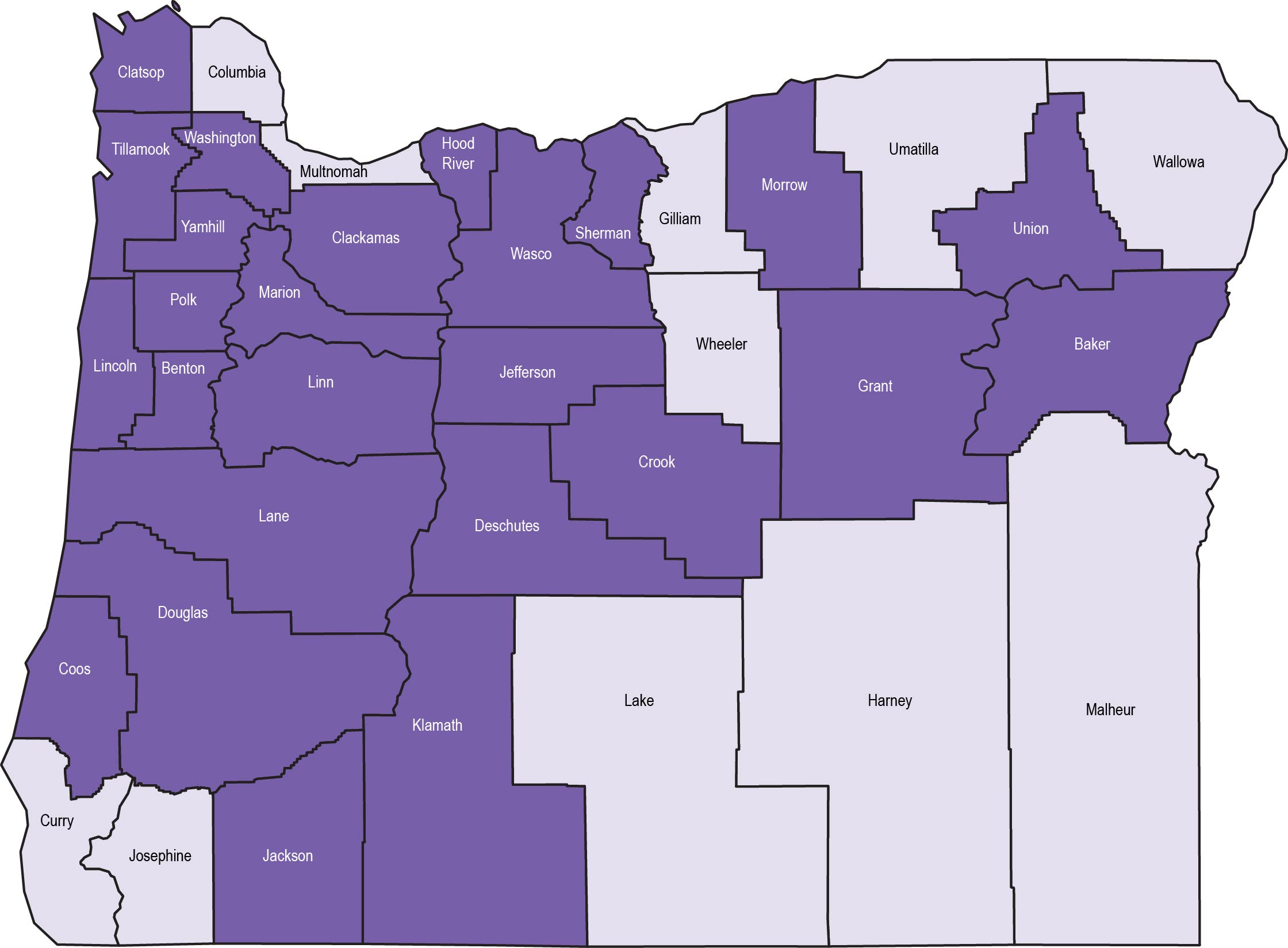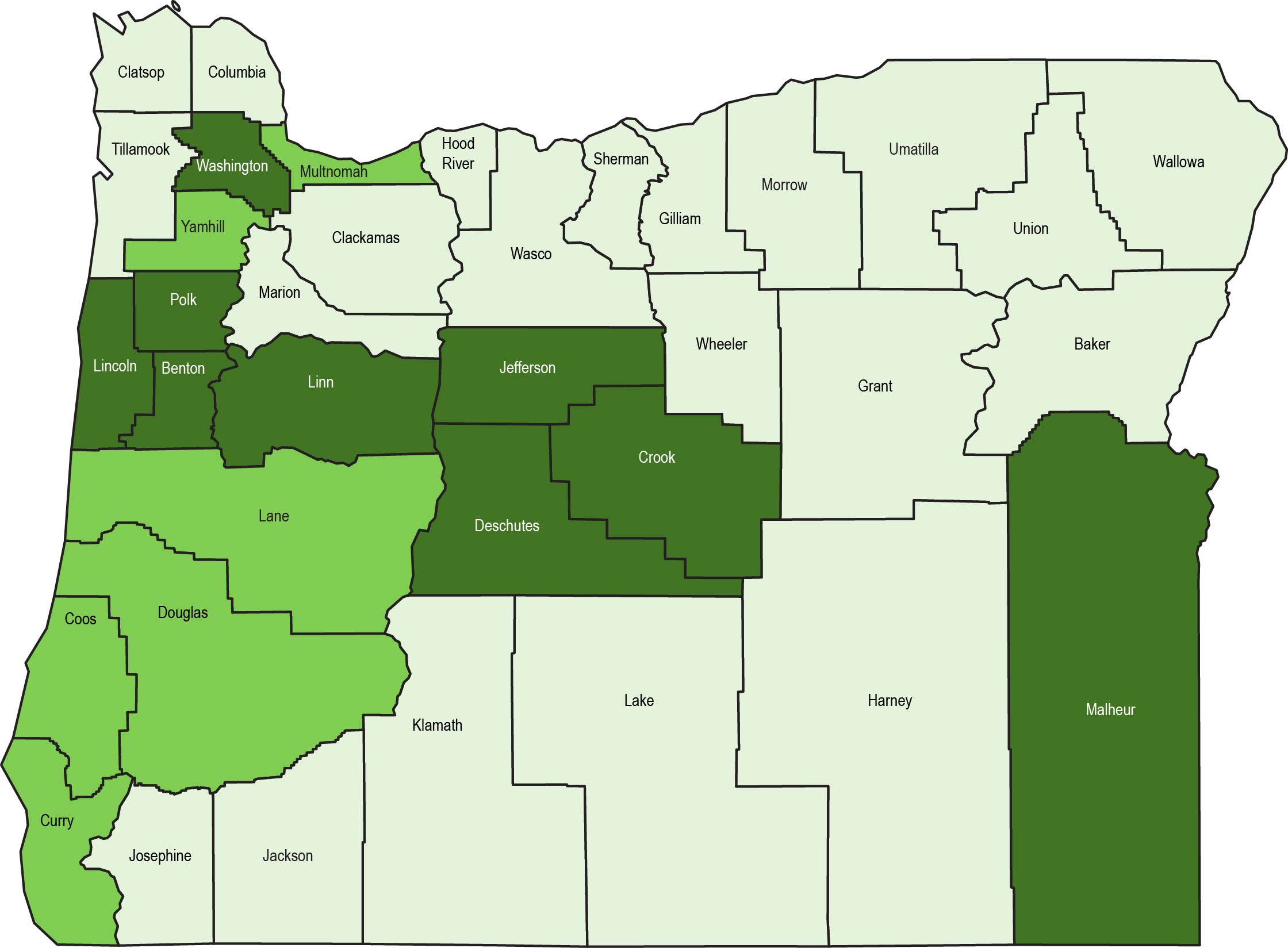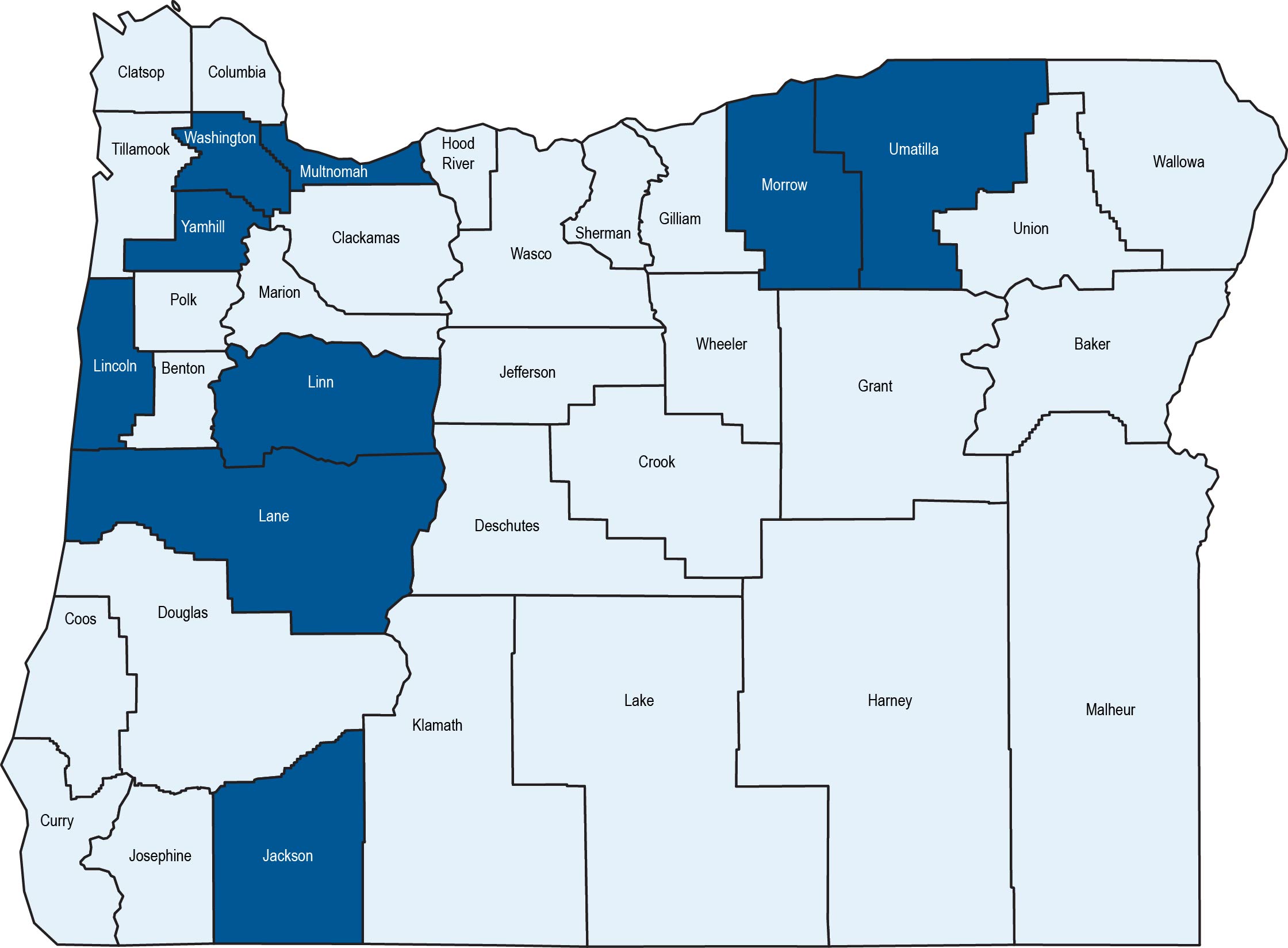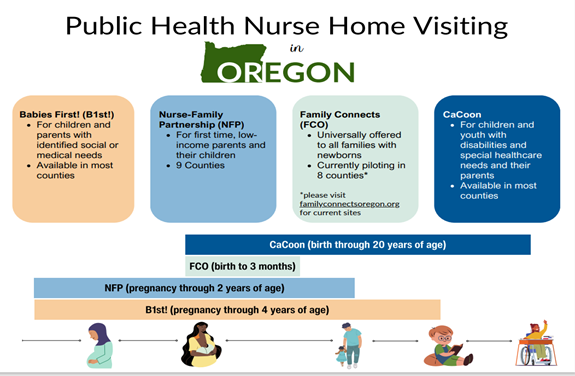This manual contains detailed information broken into chapters and sections within each chapter. At times there will be call out boxes to denote acceptable model variations, best practices, and notes. Certain key components (e.g., compliance activities, evidence-based practices) of each program may be highlighted in gray boxes.
Example of gray box:
Model variations
Best practices
General notes
HOPEful notes
The purpose of this manual is to provide a detailed program overview and resources for Public Health Nurses (PHNs), community health workers (CHWs), supervisors and administrators to use to support their work in the Babies First! and CaCoon Programs.
In 2023, the effort to combine the Babies First! and CaCoon manuals was undertaken to reduce burden on implementing staff, local agencies, and families. Across the state, the workforce for these programs is often the same or overlapping. For other agencies, they are only implementing one of the programs, usually Babies First!. It is important for programs to keep in mind that services should still be offered to those children (up to age 5) who would be eligible for CaCoon, although they will receive Nurse Home Visiting support from a Babies First! case manager. There are also some programs that work with Community Health Workers and others that do not. Differences in programs are referred to as “model variations". Approved model variations or general best practices are illustrated in tip boxes throughout the manual.
Return to top
All staff members implementing the Babies First! and CaCoon Home Visiting Programs, including but not limited to: Administrators, Nurse Supervisors, Nurse Home Visitors, Community Health Workers, and support staff.
These programs are administered by Local Public Health Departments or partnering local agencies and are tailored to address specific community needs. This localized approach ensures that families are offered the necessary support and resources within their community. Please note, not all programs are available in every county (see below for details).
Babies First! (B1st!): B1st! serves pregnant people and families with babies and children up through age 4 (up to age 5) with an identified need. Program oversight and technical assistance is provided by the State Public Health Division. Local Public Health Departments determine whether they will administer this program and which target populations to prioritize based on community need. B1st! is available in most Oregon counties. (Click on map for larger version)

CaCoon: The CaCoon program serves children and youth with disabilities and special healthcare needs from birth through age 20 (up to age 21). The Oregon Center for Children and Youth with Special Health Needs (OCCYSHN) provides oversight and technical assistance for this program. OCCYSHN is housed at the Oregon Health and Science University (OHSU). Local Public Health Departments determine whether they will administer this program and which target populations to prioritize based on community need. CaCoon is available in most Oregon counties.
(Click on map for larger version)

Family Connects Oregon (FCO): The FCO program offers between one and three home visits to every family with a newborn beginning around three weeks of age. Eligible families may be transferred from FCO to B1st or CaCoon. Oversight and technical assistance are provided by the State Public Health Division and Family Connects International. FCO is currently available in eight Oregon counties with plans to eventually be offered statewide. (Click on map for larger version)
 Nurse-Family Partnership (NFP):
Nurse-Family Partnership (NFP): The NFP program primarily serves low-income people who are pregnant for the first time. Families are visited from pregnancy until the child turns 2 years old. Technical assistance is provided by the State Public Health Division and the Nurse-Family Partnership National Service Office. NFP is currently available in nine Oregon counties.
Funding to support these programs depends on the program and the local site but may include: Oregon State General Funds, county general funds, Medicaid reimbursement, federal funds (Maternal and Child Health Title V Block Grant, Maternal Infant Early Childhood Home Visiting), and commercial insurance reimbursement (FCO only). (Click on map for larger version)
Model Variation: Babies First!
If a county does not have a CaCoon program, it is important to keep in mind that home visiting services should still be offered to children (up to age 5) who experience special healthcare needs. In these cases, best practice recommendations for CaCoon clients should be followed and the Model Variation: CaCoon tip boxes may be helpful. In other words, Babies First! nurses do not have to fulfill CaCoon program requirements, but they do need to be aware of best practices for taking care of children with special healthcare needs.

Return to top
Every family in Oregon with an identified need who wants a public health home visitor has access to one. Families served by Babies First! and CaCoon feel that their unique needs are being met and that they are supported in living healthful lives. By helping families thrive, we are supporting the well-being of our communities.
- We oppose all forms of oppression, including racism, classism, sexism, and ableism.
- We understand that individuals may face unique forms of discrimination, particularly if they belong to multiple oppressed groups.
- We work to remove systemic and social barriers to care.
- We support the inclusion of all parents, including fathers, mothers, non-binary parents, resource parents, grandparents, step-parents, adoptive parents, and all others who have taken on a parental role.
- We offer services that meet parents where they are, reducing life stressors and adding value to families' lives.
- We value lived experience.
- We believe that all home visiting services should focus on the needs of families and be sensitive to the cultural backgrounds of the individuals served.
- We believe that parent partnership is an essential part of home visiting programs.
- We believe that home visiting programs are most effective when they are designed to first and foremost meet the needs of families and children.
Babies First!
The Babies First! Program is a relationship and strength-based public health nurse (PHN) home visiting program that partners with families to improve pregnancy, family and child health outcomes, and to connect to quality health care and the community supports they have a right to.
CaCoon
CaCoon is a relationship and strength-based public health nurse (PHN) home visiting program that partners with families with children and/or youth with disabilities or unique health care needs by supporting them to access and coordinate quality health care and the community supports they have a right to.
Return to top
CCO Coordinated Care Organization
CDRC
Child Development and Rehabilitation Center
CHN Community Health Nurse
CHW Community Health Worker
CSHCN Children with Special Health Care Needs
CYSHCN
Children and Youth with Special Health Care Needs
EI/ECSE
Early Intervention/Early Childhood Special Education
EBP
Evidence-Based Practices
EIP Evidence-Informed Practice
FOC Father of Child
IFSP/IEP
Individualized Family Service Plan/Individualized Education Plan
LHS
Legacy Health Systems
LHD
Local Health Department
MAC
Medicaid Administrative Claiming
MOC Mother of Child
OCCYSHN
Oregon Center for Children and Youth with Special Health Needs
ODDS
Oregon Developmental Disabilities Services
OHA
Oregon Health Authority
OHSU
Oregon Health & Science University
OT Occupational Therapist
PHN Public Health Nurse
POC Parent of Child
PT Physical Therapist
RS
Reflective Supervision
ST Speech Therapy
SSI Supplemental Security Income
SSDI
Social Security Disability Insurance
TCM
Targeted Case Management
UCP
United Cerebral Palsy
Return to top
Self-assessments are an important part of program orientation, on-going professional development, and quality improvement. Parallel to the program approach of family-centered and trauma informed practice, we acknowledge the diversity in staff and community needs across Oregon, which also applies to training needs. Only you can assess your individual learning needs. We encourage you to take the Institute for the Advancement of Family Support Professionals Pre-Assessment and to use it to direct your ongoing learning beyond the materials included in Orientation (see Appendix C). Additional program assessments are also available (see below).
Home Visiting Staff:
Program Administration:
Return to top
Feedback Form
Please let us know if you have suggestions, any links are broken, or if any information is outdated.